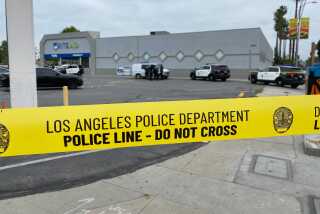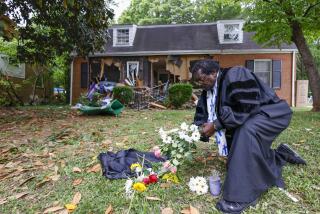Opinion: Does running from police justify execution?
- Share via
For the second time this summer, the nation is simmering over the deaths of two African-American men in two different cities in less-than-clearly-justified shootings by police.
Terence Crutcher was shot to death after his car broke down in the middle of the road in Tulsa, Okla., Friday. When officers showed up, Crutcher wouldn’t do what they told him to do. He was unarmed and walked away with his hands up just before he was shot. Keith L. Scott was shot when he brandished a handgun at officers in Charlotte, N.C., on Tuesday after he got out of his car at their orders. Or maybe it was a book. That’s what his family says.
These shootings will be examined closely by local and federal authorities, as they should. But they should also be reminders that two questions raised since Michael Brown was killed in Ferguson, Mo., two years ago remain unanswered. First, what justifies the use of deadly force? And second, does the public release of video benefit the public’s understanding of policing or make things worse?
The first question is naturally the toughest. Police are necessarily put into dangerous positions in which they must make snap judgments. If they get it wrong, innocent people may die. They may die.
But there are some situations in which use of deadly force isn’t just justified, it is righteous. For example, when someone opens fire on the public or on officers. Would anyone suggest that police ought not to have shot back when terrorism suspect Ahmad Rahami opened fire on Monday?
Moving toward officers aggressively is a gray area. Last year, two Los Angeles police officers shot to death a man who threw a bottle through the back window of their patrol vehicle, shattering it. The police officers thought they were under attack and when they got out of their car, the man ran at them so they shot him. Police Chief Charlie Beck thought it was a reasonable response given the circumstances. The Los Angeles Police Commission disagreed.
But should running away from an officer when he or she orders you to stop be a reason enough to use deadly force? It’s a crime, certainly, to evade police, but is it one that deserves a death sentence? Unless that person is reasonably suspected of hurting someone if they do get away (such as an active shooter situation) it seems excessive. That’s why the public was so outraged over the videotaped killing of Walter Scott in South Carolina last year.
Scott had been stopped for a broken taillight, not on suspicion of murder, which the officer was subsequently charged with.
The second question is less difficult. Transparency is what the public craves when someone is killed by police, and it is what has galvanized public support for the cost of outfitting police agencies with body cameras. Though videos can’t show everything, they can help put an incident in context. That appears to have been the motivation when Fresno police released video of the encounter with Dylan Noble this summer which ended with him being shot to death by officers. It was a wise decision. After watching the video I concluded I probably would have shot the guy too.
Video won’t always be clearly exculpatory. It wasn’t in the Crutcher shooting, so good for Tulsa police for releasing it anyway. Did that choice subdue potentially violent protests in Tulsa this week? Impossible to say. Just as it is impossible to conclude that the violence and chaos that Charlotte experienced Tuesday night have been avoided if police had released body-camera video showing Scott threatening officers with a handgun rather than holding a book.
Follow me @marielgarzaLAT
MORE FROM OPINION
Donald Trump’s approach to terrorism is simplistic — and seductive
Hillary Clinton’s wobble felt round the world
New overtime rules for farmworkers are long overdue
More to Read
A cure for the common opinion
Get thought-provoking perspectives with our weekly newsletter.
You may occasionally receive promotional content from the Los Angeles Times.










